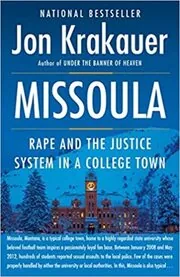Missoula Summary
Author: Jon Krakauer
This page offers our Missoula summary (Jon Krakauer's book). It opens with an overview of the book, and follows with a concise chapter-by-chapter summary.
Drafted with AI assistance and reviewed by a human editor.
As an Amazon Associate, we earn from qualifying purchases (at no extra cost to you).
This book has 1 recommender!
Overview
The narrative starts with Allison Huguet, a resident of Missoula, Montana, who suffers sexual assault at the hands of Beau Donaldson, a local university football player. Football holds a high regard in the town and its players are often privileged. Beau and Allison, who share a close friendship akin to siblings, fall apart when, after a night of heavy partying in 2010, Allison finds herself being raped by Beau. Support from her friend Keely Williams helps Allison to coax a confession out of Beau for his crime, and after wrestling with the decision for over a year, she finally reports him to the police in an attempt to make him accept the severity of his actions.
Throughout the process, Allison receives significant support from Detective Guy Baker, who expends great efforts to gather evidence for her case. They manage to secure a taped confession from Beau, marking a rare instance where police take a rape victim's story seriously. The narrative contrasts this with other rape victims in Missoula, who face apathy and disrespect from law enforcement. Among them are Kerry Barrett, Kaitlyn Kelly, and Kelsey Belnap, whose pleas for help are largely ignored by police and the local prosecutor's office who deem there's not enough proof to take their cases to court.
However, Kaitlyn Kelly opts to report her rape to the University of Montana, leading to the expulsion of her perpetrator, Calvin Smith, based on a new evidence standard. Public prosecutor Kirsten Pabst’s support of Smith at his hearing shocks Kelly, leading to increased media scrutiny over how rape cases are handled in Missoula. This pressure leads to County Attorney Fred Van Valkenberg taking on Allison’s case, resulting in Beau receiving a maximum sentence. Later, despite her questionable past in prosecuting rape cases, Pabst enters private practice and successfully defends another rapist, Jordan Johnson, in court. Following Johnson’s trial, the U.S. Department of Justice makes recommendations on handling rape cases in Missoula, leading to significant changes in the local prosecutor's office and the eventual election of Pabst as County Attorney.
Edited by
Software engineer whose passion for tracking book recommendations from podcasts inspired the creation of MRB.
Lead investor at 3one4 Capital whose startup expertise and love for books helped shaped MRB and its growth.







Comments
Did we miss something? Have feedback?
Help us improve this page by sharing your thoughts